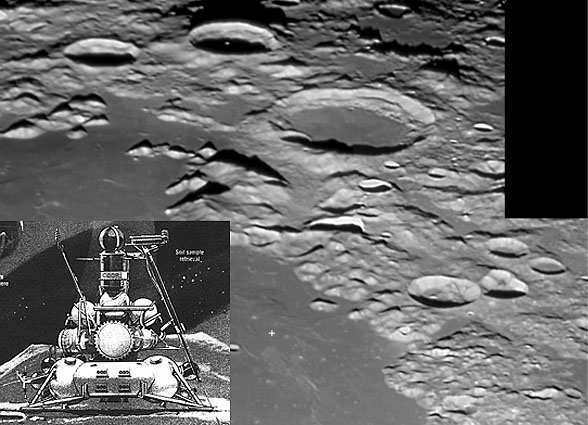Difference between revisions of "August 18, 2004"
| Line 2: | Line 2: | ||
=Last Rocks from the Moon= | =Last Rocks from the Moon= | ||
<br> | <br> | ||
| − | |||
| − | |||
| − | |||
| − | |||
| − | |||
| − | |||
| − | |||
<table width="85%" border="0" align="center" cellpadding="6" cellspacing="2"> | <table width="85%" border="0" align="center" cellpadding="6" cellspacing="2"> | ||
<tr> | <tr> | ||
| Line 24: | Line 17: | ||
<p class="story" align="center"><b>Last Rocks from the Moon</b></p> | <p class="story" align="center"><b>Last Rocks from the Moon</b></p> | ||
<p class="story" align="left"> | <p class="story" align="left"> | ||
| − | On August 18, 1976 - 28 years ago today - the Luna 24 spacecraft landed on the Moon in southeastern Mare Crisium. Following two previous failures (Oct 1974 and Oct 1975) Luna 24 successfully landed at 12.25 degrees N, 62.2 degrees E, just a few hundred meters from the damaged Luna 21 spacecraft. A drill bored down 2.5 meters into the mare regolith (surface soil and smashed rocks) and saved the core samples curled up like an intestine in a protective cylinder that was launched back to Earth. The returned 170 grams of lunar samples - the last brought from the Moon - were very low titanium basalts, 3.30 billion years old - younger than most other sampled lunar basalts. The eastern limb and Crisium area deserves more high resolution imaging, such as this shot by KC, because the Lunar Orbiter IV cameras failed while imaging this region. | + | On August 18, 1976 - 28 years ago today - the Luna 24 spacecraft landed on the Moon in southeastern Mare Crisium. Following two previous failures (Oct 1974 and Oct 1975) Luna 24 successfully landed at 12.25 degrees N, 62.2 degrees E, just a few hundred meters from the damaged Luna 21 spacecraft. A drill bored down 2.5 meters into the mare regolith (surface soil and smashed rocks) and saved the core samples curled up like an intestine in a protective cylinder that was launched back to Earth. The returned 170 grams of lunar samples - the last brought from the Moon - were very low titanium basalts, 3.30 billion years old - younger than most other sampled lunar basalts. The eastern limb and Crisium area deserves more high resolution imaging, such as this shot by KC, because the Lunar Orbiter IV cameras failed while imaging this region.</p> |
<blockquote> | <blockquote> | ||
<p align="right"> — [mailto:tychocrater@yahoo.com Chuck Wood ]</p> | <p align="right"> — [mailto:tychocrater@yahoo.com Chuck Wood ]</p> | ||
Revision as of 11:57, 17 January 2015
Last Rocks from the Moon
Image Credit: KC Pau |
|
Last Rocks from the Moon On August 18, 1976 - 28 years ago today - the Luna 24 spacecraft landed on the Moon in southeastern Mare Crisium. Following two previous failures (Oct 1974 and Oct 1975) Luna 24 successfully landed at 12.25 degrees N, 62.2 degrees E, just a few hundred meters from the damaged Luna 21 spacecraft. A drill bored down 2.5 meters into the mare regolith (surface soil and smashed rocks) and saved the core samples curled up like an intestine in a protective cylinder that was launched back to Earth. The returned 170 grams of lunar samples - the last brought from the Moon - were very low titanium basalts, 3.30 billion years old - younger than most other sampled lunar basalts. The eastern limb and Crisium area deserves more high resolution imaging, such as this shot by KC, because the Lunar Orbiter IV cameras failed while imaging this region. Technical Details: Related Links: Tomorrow's LPOD: A New Dome? |
Author & Editor: Technical Consultant: A service of: |
COMMENTS?
Register, and click on the Discussion tab at the top of the page.




